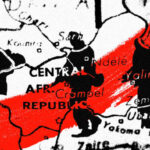
UNITED NATIONS (AP) — Russia’s U.N. ambassador says it’s “alarming” that less than three weeks before the annual meeting of world leaders at the U.N. General Assembly not a single member of the 56-member Russian advance team and delegation headed by Foreign Minister Sergey Lavrov has received a U.S. entry visa.
Vassily Nebenzia said in a letter to U.N. Secretary-General Antonio Guterres obtained Friday night by The Associated Press that “this is even more alarming since for the last several months the authorities of the United States have been constantly refusing to grant entry visas to a number of Russian delegates assigned to take part in the official United Nations events.”
The Russian ambassador stressed that the United States, as the host country of the United Nations, is legally required to issue visas, adding that application to attend the high-level U.N. meetings starting Sept. 19 had been submitted to the U.S. Embassy in Moscow.
Nebenzia asked Guterres “to once again emphasize to the authorities of the United States that they must promptly issue requested visas for all Russian delegates and accompanying persons,” including journalists covering Lavrov’s visit.
Already bad relations between the United States and Russia have worsened dramatically since Russia’s Feb. 24 invasion of Ukraine. The Biden administration sees Russia and Russian President Vladimir Putin’s war in Ukraine as the most acute and immediate threat to international stability, and it has been leading an international coalition supporting Ukraine.
A spokesperson for the U.S. Mission to the United Nations said the United States takes its host country obligations seriously and processes “hundreds of visas every year for Russian Federation delegates to U.N. events.”
“To ensure timely processing, we repeatedly remind the Russian Mission to the U.N., as we do all other U.N. missions, that the United States needs applications as early as possible,” said the spokesperson, who was not authorized to be quoted by name.
“This is especially important,” the U.S. spokesperson said, “because of Russia’s unwarranted actions against our embassy in Russia, including the forced termination of local and third country national staff, which have severely limited our staffing and therefore our capacity to process visas.”
In his letter, Nebenzia said among the last examples of U.S. refusals to grant entry visas were to Minister of Internal Affairs Vladimir Kolokoltsev to participate in the just ended U.N. chiefs of police summit and to Russian representatives seeking to attend a meeting that began Aug. 29 and continues until Sept. 9 on drafting an “International Convention on Countering the Use of Information and Communications Technologies for Criminal Purposes.”
The Russian ambassador quoted from the 1947 agreement between the United Nations and the United States which states that “visas shall be granted without charge and as promptly as possible” and that this “shall be applicable irrespective of the relations existing between the governments of the persons referred to … and the government of the United States.”
U.N. associate spokesperson Florencia Soto Nino-Martinez said the United Nations remains in close contact with the U.S. on issues under the U.N.-U.S. headquarters agreement including visas, and “we are doing so in this case” raised by Russia.




